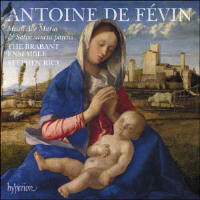Texte paru dans: / Appeared in: |
|
|
Outil de traduction ~ (Très approximatif) |
|
|
Reviewer: J.
F. Weber
Antoine de Févin
(c.1470–1511/12) had a short life that fell within the lifetimes of Josquin
des Prez, Pierre de la Rue, and Heinrich Isaac, but he is much less familiar
than they are. That is, no doubt, why Stephen Rice has added him to the list
of obscure Renaissance composers that he has favored in this series. Born in
Arras, his date of birth is only conjectural. His father was an alderman and
his brother Robert was also a composer. He became a priest, although there
is no documentation of that. He may have studied at a university, judging by
the title maistre that is given to him. The first known date is 1507, when
he was already a singer and composer at the chapelle royale of Louis
XII. He died at Blois in late 1511 or early 1512, when Guillaume Crétin
composed a déploration for another court singer that mentioned him at
length. Anyone who tried to write a biography using that set of data would
never get published. In his notes Rice shows why he is woefull
Févin’s surviving music
includes 14 Masses, three lamentations, three Magnificats, 14 motets, and 17
chansons. An edition of his collected works by Edward Clinkscale has been
ongoing ever since the latter’s 1965 Ph.D. dissertation at NYU. The
Fanfare Archive shows two recordings of a Requiem attributed to Févin (Fanfare
36:1 for both), but otherwise a dozen short pieces, mostly secular songs,
are all that can be found there. There is also a 2006 recording of the
Requiem in the Occo Codex (Mirasound) that is superior to both of the
others. Three movements of a Missa de feria are included in The
Seven Sins of Hieronymus Bosch (Globe).
The two Masses and two of the
motets on this disc are first recordings. The other piece, the Sancta
Trinitas for four voices, was included on Sacred Songs of France, Vol. 1
(36:4), where it was called “most famous,” an evaluation that Rice accepts.
The setting à 6 that follows on the program is the same piece with two
additional voices added by Arnold von Bruck. The record also has the chant
cantus firmus for Missa Salve sancta parens, an introit for Masses of
the Blessed Virgin. Each Mass is over half an hour long, so the disc timing
is very generous. In addition, the model for this Missa Ave Maria,
Josquin des Prez’s motet Ave Maria ... virgo serena, was recorded (in the
version found in Petrucci’s Motetti A) but not included on the
disc in order to fill it with Févin; it can be downloaded from their website
or Hyperion’s. The music certainly deserves to be made available, for Févin has all the grasp of style and form that his well-known contemporaries display. The performances, too, are lovely, with superb vocal tone, blended voices, and balanced vocal sections. Rice has a firm grasp of the interpretation of the music, choosing to assign the duets of the Masses to solo singers. We have come to appreciate Renaissance sacred music sung one to a part (Orlando Consort), two to a part (Tallis Scholars), or slightly larger ensembles such as this one (The Sixteen). I mention only English groups in order to keep the idea focused, but there are similar groups across Western Europe that are also effective. Rice has an enviable record with his attention both to neglected composers such as Févin and to those, such as Lassus and Palestrina, who need no help from him but provide a frame of reference for comparisons with his interpretation of unique works. While the other three ensembles mentioned use some of the same singers, Rice has gathered own group from the start. This is a must-hear for anyone who loves Renaissance polyphony. | |
|
|
|
|
Cliquez l'un ou l'autre
bouton pour découvrir bien d'autres critiques de CD |
|




